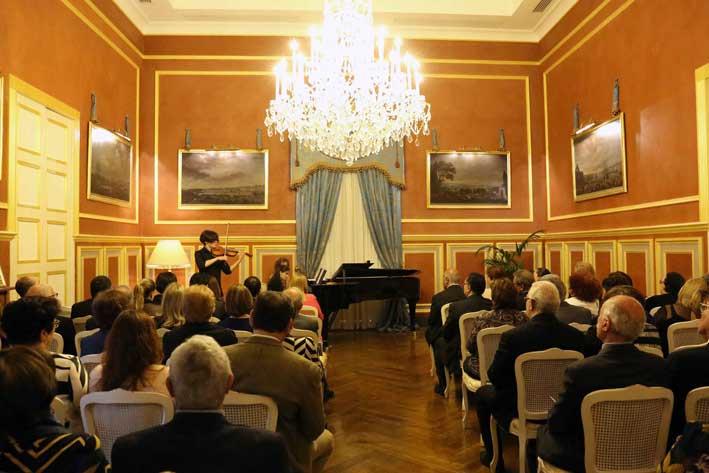Food for the soul at San Anton
The scene was set in the Agatha Barbara Music Room at San Anton Palace recently: two young musicians, Ginevra Costantin Negri on the piano and Indro Borreani on the violin were to entertain us that balmy evening. In very good English Ginevra informed the audience that since our President could not stay throughout the concert they were going to play the last piece on the programme, Paganini's Mosé Fantasia, first. And that was the start of an evening of excellent musicmaking. Ginevra on the piano and Indra Borreani playing on a 2000 Domenico Fantini Violin were like teenage athletes just about to hit peak form.
We all know that Italy has produced dazzling musicians and equally dazzling composers and this was an evening sponsored by the Italian Embassy in Malta and Simonds Farsons Cisk plc. The programme was largely made up of Rossini and Paganini compositions and, appropriately, being spring, Beethovan's Sonata for violin and piano No 5 in F major - La Primavera, which set the tone for the evening.
Ginevra and Indro who are both 17-years-old matched their virtuosity with their bouncy brio. I was pleased that they made me feel glad to have turned up to hear them, rather than sit at home and listen to CDs or You tube.
That evening was like a smooth tourist coach trip through the spectacular landscape of mostly Italian music.

And so to Indro who gave us a selection from Paganini's Capricci. Paganini was a superstar in his lifetime (1792-1840). During his performances he was the consummate showman, able to perform all sorts of stunts using his violin. His playing was outrageously good. He could play complete works with just two strings on his violin instead of four. Sometimes he would even deliberately snap some of the strings mid-performance - and still play the piece brilliantly. In his time there were even stories suggesting that the only way anybody could possibly play the violin that well was if they had entered into a pact with the Devil. (Had he been a woman he would almost certainly have been accused of being a witch). When he died, the Church initially refused to allow Paganini's body to be buried on its land for this reason. Let us not forgot that over 100 years later, Archbishop Gonzi, too, interdicted those who read a Labour Party newspaper or indeed, were associated in any way with the Labour Party. They had to get married in the sacristy and were not buried on sacred ground. Yes, lest we forget. No one would dare do that today. Facebook would be after their blood.
Paganini was in no doubt about the benefits of being seen as a showman, saying: 'I'm not handsome, but when women hear me play, they come crawling to my feet.'

Ginevra and Indro, that evening, also played Rossini. This Italian composer (1792-1868) wrote both comic and tragic operas to equal acclaim. Il Barbiere di Siviglia, William Tell and La Gazza Ladra immediately come to mind. He created new works very quickly, and it never seemed to take him longer than a few weeks to write an opera. At the height of his creative powers, he once said: 'Give me a laundry list and I will set it to music,' of such magnitude was his gift.
That evening Ginevra played an absolutely delightful piano solo by Rossini: Un petit train de plaisir. It describes a train journey made by the composer, starting with the bell announcing the arrival of the train, getting aboard, the journey, and the train whistle before arriving at a station where "Les Lions Parisiens offrent la main aux Biches pour descendre du wagon." The journey continues but is stopped with a terrible derailment in which two people are mortally wounded, one going to Paradise and the other to Hell. A Funeral March is followed by a cheery dance from their heirs. 'Chant funèbre. Amen. Doleur aiguë des héritiers.' The pianist very skillfully recited the verses in French while interspersing them with the music. I loved its ironic tone.
It was exhilarating to watch these youngsters bring so much light and colour in the room. Their musical gifts appear almost unlimited. Indro coaxed from his violin music of intense refinement. Ginevra displayed her talent with great confidence.
To me it seems a pity that there are more popular heroes in sport than in music.
That evening the audience should have been on its feet to salute these gifted and hardworking teenagers. Both have won a number of competitions, played in several countries and Ginevra is currently recording her first CD.
After the concert I went to congratulate them and thank them. They are obviously not letting their success go to their heads and seemed almost surprised when I told them how impressed I was with their musicmaking and that they will get far.
[email protected]